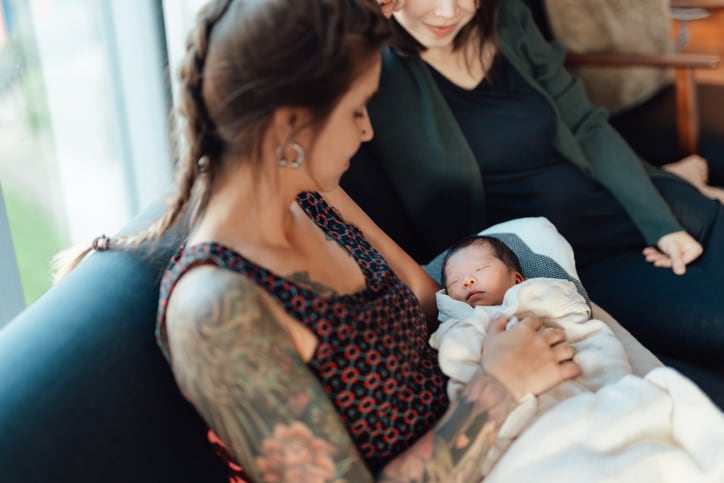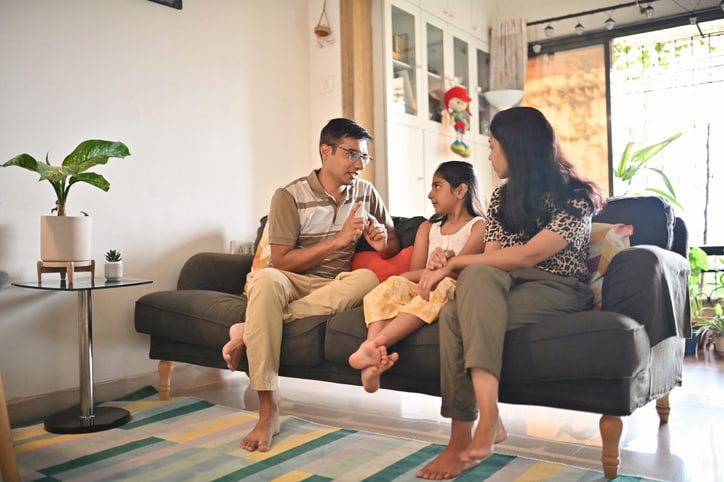Adopting a new name, pronouns and gender-neutral terms are often a critical step in a nonbinary person’s journey of self-acceptance and coming out, says Arjee Javellana Restar, who holds her doctorate in behavioral science and is a social epidemiologist as well as an assistant professor at the University of Washington and a research faculty affiliate at Yale.
“Most nonbinary people do not subscribe to binary, gendered systems,” says Restar, whose research focuses on transgender and nonbinary healthcare and policy. “This includes rejecting roles and languages — like Mom or Dad — that are socially gendered, and embracing ones that align and affirm their nonbinary identity.”
Restar explains that gender affirmation is multifaceted and personal; it can incorporate social, medical and legal changes. And these steps go far beyond personal preference.
“Multiple scientific studies have shown that all of these gender-affirming facets have been linked to improved quality of life and more positive mental health outcomes for nonbinary people,” she says. “Conversely, multiple studies have also shown that non-affirmation can lead to deleterious outcomes including poor mental health such as depression and suicide.”
Restar believes nonbinary parents have an opportunity to “reimagine and restructure parenting outside the binary gender parenting roles” in whatever way works for their family. If you’re a nonbinary parent trying to decide on an affirming name your kids can call you, check out this list of gender neutral parent names for inspiration. Here, real nonbinary parents share what they use and why they chose to change — or not change — their parenting name.
1. Abba
“In Judaism, that is the traditional name for dad. However, to me, it sounds gender-neutral and easy to pronounce, so I think it will be easy for my child to say. As a nonbinary person and someone for whom traditional gender roles do not fit, it was important to me that my child used a name that didn’t fit into the binary mom/dad. I want my child to grow up with flexibility around gender and all that it entails, such as the roles that our caregivers have.” — Sam C. (they/them), parent in the San Francisco Bay Area, California
“I’ve always treasured ‘Mapa’ as a marker of parenting that’s gender fluid and recognizes the mix of traditional gender roles that parenting asks of us.”
— Eric LeMay (he/them), parent in Athens, Ohio
2. Ama
“I like that this is close to ‘Mama’ without the gender implication. It should still be easy for my little one to learn/pronounce early on!” — Melissa McTernan (she/they), parent in Boston, Massachusetts
3. Dad/Daddy (or whatever name you were already using)
“Although I am nonbinary, I continue to use gendered nouns for my closest relationships like Dad or Daddy, Husband, Brother. The gender binary is short-sighted and outdated. We all experience our gender identity differently and we all get the opportunity to choose how we express our gender to include pronouns, nouns and other language. Choosing they/them for my pronouns is an outward expression of my belief in the gender spectrum and my pride in my fluidity. Gendered nouns are not bothersome or triggering to me when they represent an intimate relationship with those I love, because the way I experience my gender is very fluid. I am often one, or the other, or both or neither.” — Don Mamone (they/them), parent in Dallas, Texas
Read more:
4. Mama — but considered Maddy
“Our twin boys are 11-and-a-half, and when my wife and I were getting ready to start our family, at that time I thought my options were Mommy or Mama. Although knowing we could have used any name, my wife would be Mommy and me Mama, since that is what so many lesbian couples were doing. Over the past 10+ years, I have gotten more comfortable with my gender and gender identity. Even though I might have chosen something like ‘Maddy’ now if our kids were being born today, since it has been 11+ years with them calling me Mama, I haven’t felt too much like changing it.” — Maria Palladino (they/she), parent in Atlanta, Georgia
5. Mapa
“When our son was learning to speak, his first word was ‘Mama,’ then he eventually called me ‘Papa,’ but at a certain point he decided I was ‘Mapa,’ a mix of the two. This happened before I awoke to the fact that I was nonbinary, so he eventually returned to ‘Papa,’ but I’ve always treasured ‘Mapa’ as a marker of parenting that’s gender fluid and recognizes the mix of traditional gender roles that parenting asks of us.” — Eric LeMay (he/they), parent in Athens, Ohio
6. Nomy (pronounced No-me)
“I didn’t come out as nonbinary until my children were all born, so they called me Mom and Mommy originally. When I realized it would be nice to have a parental title that was non-gendered, it was hard to figure out how to move forward. In the end and with my spouse’s support, I started a conversation with our oldest. He became a part of the discussion and together we decided on Nomy; it was an option we found in an obscure, online list of options. The other children were so young, they don’t really remember me as ‘Mom.’ That means I have one child that helped me find a good name, and the other two have only known me as Nomy.” — Anja Wahl Wells (they/them), parent in Loveland, Colorado
7. Pop/Poppy
“I go by Pop mostly, but also occasionally Poppy and recently PaPa for one of my kiddos. I previously went by Mama and it didn’t feel right, so I do remember doing some research, but don’t remember how I landed on Pop. I absolutely love being called any of the above names. It makes me proud to hear my parent name from my kids. A lot of people are very confused by it because they believe it is solely for men, but my kids know my role and that’s all that really matters.” — Lace Whaley (they/them), parent in Western Central Illinois
8. Ren/Renny
“I use diminutive forms of the word ‘parent’ as ‘Ren’ and ‘Renny.’ When I looked at the combination of my nonbinary gender identity and my want to become a parent, I knew ‘Mom’ and ‘Dad’ wouldn’t be right for me. The options I found online were often combinations of binary terms (e.g. Mapa) and that doesn’t fit my gender experience. There were also terms from other languages and cultures. As a white person, I only felt comfortable looking to my heritage and didn’t find anything there that resonated with me. Ren/Renny felt the most neutral option. It feels affirmative to my gender. I just wish it was widely known because my child will likely never be able to tell a cis caregiver about their ‘Renny’ without having to explain using sterile-sounding ‘parent’ or a binary gendered term.” — Blue Inessa (ze/they), parent in Logan, Utah
9. Your First Name (in this case, Steph)
“Figuring out a nonbinary parent name and identity has been a challenge that came up pretty quickly. I’ve always been me, but I never really had the words or support to express this part of me until recently. Because of that, I started coming out after having my kid. He’s 4 and had already been calling me ‘Mom’ for quite some time, and I hadn’t found an alternative name that felt intuitive to switch to, so we’ve stuck with ‘Mom’ for now. I’ve also started to encourage him to call me by my name, Steph, as an alternative.” — Steph Campbell (they/them), parent in Commerce Township, Michigan
“When I hear ZaZa or see the sign for ZaZa, it is an incredibly validating and euphoric experience, and I wouldn’t have it any other way.”
— Sam Rodriguez (they/them), parent in Chesapeake, Virginia
10. Zaza
“Before the birth of my child, it was meaningful for me to find a parent name that aligned with who I was as a nonbinary person. I found ZaZa, and several other neutral terms for parents and sat with them for a while before deciding on ZaZa. My wife is Deaf, and my child is a CODA (child of a Deaf adult), so after choosing my English parent name, a friend from the Deaf community suggested an ASL sign to use differently from the gendered ASL signs for Mom and Dad. When I hear ZaZa or see the sign for ZaZa, it is an incredibly validating and euphoric experience, and I wouldn’t have it any other way.” — Sam Rodriguez (they/them), parent in Chesapeake, Virginia
The bottom line on choosing nonbinary parent names
You can’t go wrong, as long as it feels right to you. Some parents look to their cultural traditions or make up something from scratch. As you’ve just read, others decide to change their pronouns and/or first name but keep their original parenting name.
Restar admits that while taking steps like using nonbinary parent names can be incredibly affirming, it isn’t always easy. “It can be challenging and isolating to navigate given the lack of resources that are dedicated to nonbinary parenthood, including not having enough family-based clinics and support groups or programs,” she says. It’s understandable that some nonbinary parents worry about being misgendered, both by their kids and their kids’ peers, she says.
This is an area that substantively needs more attention, says Restar, given that more people are coming out as nonbinary. But despite the challenges, nonbinary parents have a unique opportunity to reimagine parenthood.
“This can both be liberating and beautiful to explore, given that it provides nonbinary parents a more personalized adaptive approach to parenthood and opportunities to decide around what aspects of parenting feels affirming,” says Restar. And for some nonbinary parents, changing their parent name is a big piece of the puzzle.






